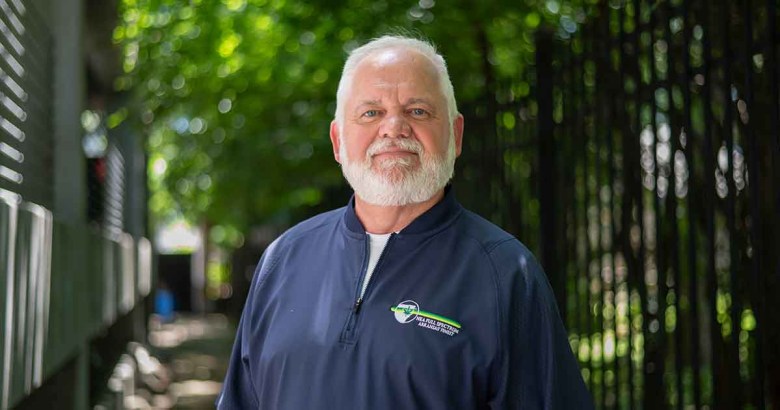
As a former Marine and state trooper, Lance Huey’s career path to being a marijuana dispensary executive bears a closer resemblance to “Walker, Texas Ranger” than it does to a Cheech and Chong movie.
Huey served in the Marines, patrolled eastern Arkansas as a state trooper, was elected to the Grant County Quorum Court and later became Grant County sheriff before heading up security for the Arkansas Scholarship Lottery, then a new state agency.
When the state medical marijuana industry was getting off the ground, Huey worked with White Hall marijuana cultivator Natural State Medicinals as a security consultant, advising the business on things like security cameras and fencing. Later, he joined the cultivator full time as its director of security.
In 2019, Huey joined the NEA Full Spectrum dispensary in Brookland (Craighead County) as the store’s general manager and, last year, was named the store’s chief operating officer.
Huey’s name might be familiar to Arkansas newswatchers. Before entering the marijuana world, Huey landed in the news in 2009 when left his job as sheriff to become the director of security at the lottery. The state agency was just getting off the ground and its high salaries were already under the microscope when Huey was hired as one its first 10 employees. Huey’s lottery salary of $115,000 a year was about $70,000 higher than his pay as sheriff, but Huey defended the figure in interviews at the time.
In 2022, Huey appeared in television ads supporting a constitutional amendment that would have legalized recreational marijuana in Arkansas. Huey, who grew up in Wynne and describes himself as “an old Northeast Arkansas boy,” appeared in the ad dressed in camo, driving a truck and carrying a gun in the woods. The ad gave the cannabis amendment a down-home, rural vibe, while also imbuing it with Huey’s law enforcement bona fides. Huey said on camera he was supporting the proposal to “safely legalize cannabis for adults” and championed the millions of dollars the plan would have generated for law enforcement officers.
“I knew, as a rural county sheriff, that was much needed,” he told us in June.
His support came with a price; Huey said there were some “pretty stout opinions” from those in the law enforcement community, particularly those who didn’t know him. The officers who knew him personally may have disagreed with him on the issue, he said, but they didn’t treat him any differently.
Huey was also a petitioner on the campaign’s appeal to the Arkansas Supreme Court after a state governing body had refused to allow the amendment on the ballot. The Supreme Court later ruled in the campaign’s favor and allowed the measure onto the ballot.
Huey said some of the concern about his participation in the marijuana campaign has died down since the recreational marijuana amendment “went down smoking” in 2022. The measure failed by a vote of 56% to 44%.
Aside from the state medical marijuana industry, Huey has a firsthand perspective on how marijuana cases are handled by law enforcement. Many officers look at marijuana as something that’s illegal, but he said it’s not that simple. “My attitude was: It’s against the law, but so is speeding,” Huey said. There’s a big difference between trafficking drugs and carrying a small amount for personal use, he said, and it’s often not worth the effort to arrest someone for possessing a small amount of marijuana. Such an arrest would require the officer to process the suspect, take the suspected marijuana, store it in an evidence locker, have it tested by a certified lab and send the test results with the case file to the prosecutor. If the suspect is ultimately fined for the offense, someone in the court system would have to track them.
“You tie up a number of people and a number of resources for that ounce or ounce and a half of marijuana,” he said. As an officer, Huey said he upheld the law, but also noted that officers in the field have discretion on how to handle the cases. There are “a lot bigger problems” than someone who possesses a small, usable amount of marijuana, he said. Huey was in law enforcement at a time when there weren’t as many cameras watching officers, and said it was easier then to “give a person a break” by dumping out a baggy of marijuana on the side of the road and letting the person go.
On a personal level, Huey said, he was impacted in the early 1990s when he saw his uncle’s struggles with pancreatic cancer become more manageable with marijuana. “I knew then that there was something to it,” he said.
Huey said he is not a medical marijuana cardholder and said he doesn’t have any of the qualifying conditions for obtaining a card in Arkansas. He’s not a marijuana user, but said he doesn’t have a problem with anyone who is. Huey also said he thinks a recent change to state law to allow medical marijuana cardholders to obtain concealed handgun carry licenses will have a big impact on people who are considering obtaining a medical marijuana card. “I was glad to see that the law did change to make it fair,” he said.
